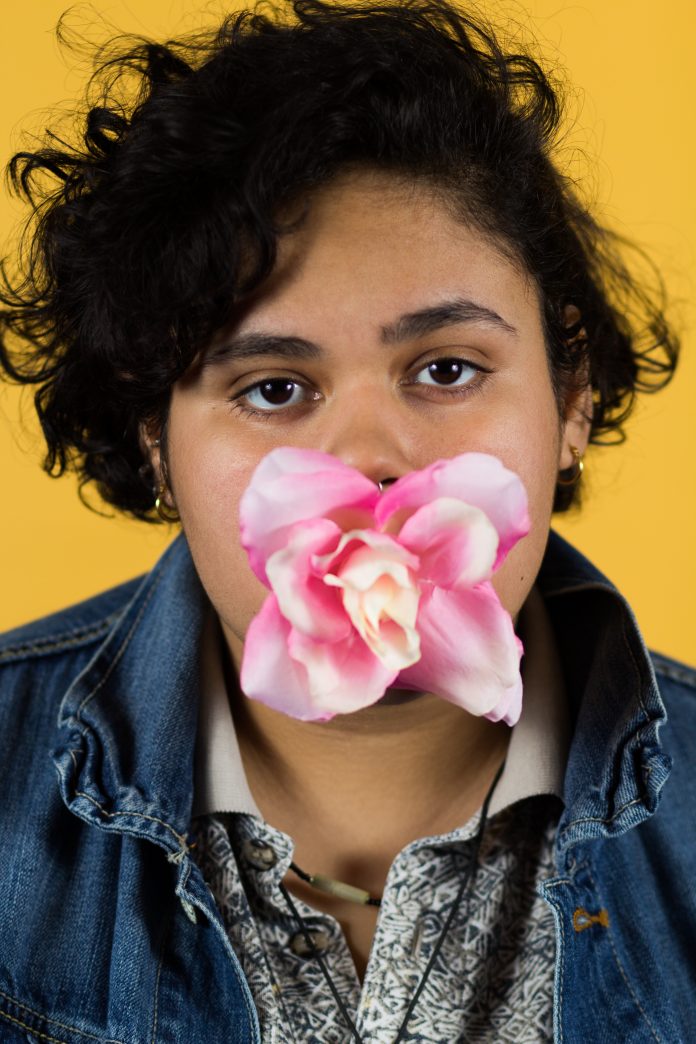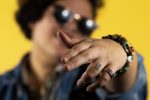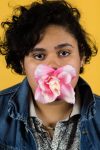
Byron: We’re here with Greisy-- very fashionable person on campus. I see your outfit here today, tell me about it. How did you put it together?
Greisy: The jacket is a jean jacket that I got from Rescued Treasures; I do service there for Bonner. So I’ll usually do a couple hours of service and then as I’m helping put stuff on the rack and cleaning up, I’m peeping what I like. By the end of the day, I have a couple new fits. I hate shopping. I don’t go to the mall. For me, I grew up really poor, so all of the clothes that I was getting was from my cousins. And I was always a really big girl. I’ve always been super tall and chubby, so it’d be men’s clothes that I was getting. So I’d get a bunch of clothes from my male cousins and I had to work with that ‘cause I really didn’t have the option to go to Forever 21 or H&M or anything like that. And then when I got to college and had the option of having money to buy clothes, I was already so into the cycle of “wear what you have” and what’s in your closet. I still don’t really care for shopping name brand I guess.
B: So you like to make do and put together what you can. How’d you put together this outfit?
G: I woke up today and I was like “what can I wear,” because I gotta pop out apparently. I love wearing a jean jacket in this weather because I feel like it’s always a fresh look. This shirt I also got at Rescued Treasures. I guess you could say it’s like a dad kind of shirt. To be honest, this whole outfit is probably less than twenty dollars.
B: So your piercings. What made you get them?
G: When I was born my mom pierced my sh--t a few months into my life. Pierced the first two. I have a second hole here. My sister did that in my kitchen when I was fifteen with a needle and ice. I do them too so if you ever need a piercing let me know. My third one, same thing. Needle and ice. I just do these at home. My tragus I got at a shop. I got this when I was fifteen in New York. Got the septum over the summer. I usually cut my hair to change stuff up, but I wanted to let my hair grow, so I was like, well to compensate, I gotta add something else to the way I look, so I got a septum. And I’ve had a nose piercing since I was sixteen.
B: Do they have any significant meaning to you or is it just something to accentuate your style?
G: I think for me my piercings are part of-- I call it the “queer aesthetic.” And that can be a little problematic ‘cause queer people don’t look a certain way. For me, it helps me express myself. Yeah, for me, my piercings are just a way to stand apart from the crowd. Just like me being queer is way to set myself apart from heteronormativity.
B: So how has your sexual orientation influenced your style and being on DePauw’s campus?
G: My sexual orientation and also my weight-- not that I’ve struggled with weight ‘cause I’m okay with how I am. But growing up, I always felt the need to cover up because I was fat or chubbier than other girls and that was coming from outside influences like family where it was like ‘if you look like this you can’t dress like that’; where people are like ‘fat girls can’t wear crop tops.’ I kind of internalized that. And also where I’m from, New York. Catcalling is a big thing. I never really felt safe when I dressed more fem. Actually have a poem called “On the Male Gaze,” where I talk about how much of my gender expression is due to the fact that I can’t be comfortable in my body without men tracking me or calling me on the streets, etcetera, etcetera. So that’s something I’ve really been grappling with. But when I identify myself to others, I say that I’m a masc presenting queer woman. ‘Cause not all queer women present masculine. Some are very feminine. For me though, I lean towards more of like a masculine presenting gender expression just because I feel more comfortable in it. But I’ve definitely been more fem in the past.
B: And so your hair. How did you come up with that style? Did anybody influence that kind of style?
G: I’ve had quite the hair journey. My hair was at my shoulders when I was fifteen, and I chopped it off, mad short. Like really, really short. And then, from fifteen to twenty one, I was shaving one side or shaving both sides. I had a man bun my freshman year at DePauw and my sophomore year. So I had a bun going on, but the sides were shaved. And then, something happened. For me, cutting my hair was a liberating thing. I was going through a lot my sophomore year. So my sophomore year, I cut it again. So it was back to being short. Then I died it. The I dyed it again this summer to black. Then, I stopped cutting my hair. So my hair is currently in the growing out process. So this style right now is just me figuring out what I’m trying to do with all this hair. And that was a big decision for me to make ‘cause I feel like hair for me has always been another marker of my queerness. There’s a perception that if you are a woman with short hair, you’re probably gay. For me, it was a way to step into my queerness. I was in the closet up until I cut my hair. And I felt more liberated and more at ease and saying who I was when I cut my hair. But right now it’s growing and I think that, for me, what my hair means now is that. I came to the conclusion that I want to let my hair grow ‘cause I want a visualization of the growth that I’ve been doing from that moment. For me right now, it’s been really empowering. To see my curls coming back and see my hair reach places that it hasn’t been. It means that I’m growing and I’m growing with my body and I’m growing away from the things that I thought were gonna be super impossible to get over. But here’s my hair and it’s a testament to the growth. Otherwise, if you would’ve met me a year and a half ago? Shaved. Everything shaved.
B: So where do you see your hair journey going on in five years?
G: To be honest? Kehlani. Her hair is fire; like when she has it without her extensions and stuff. She has it at a shoulder length, and she’s just rocking her curls. But we have similar hair textures. So I’m thinking maybe a shoulder length. If I don’t like it at my shoulder, then I’ll cut it back to where it is now because I really like this thing.
B: Is Kehlani one of your celebrities that have influenced your style?
G: I don’t think I’ve had a celebrity influence my style. But this year, a freshman told me that when she first met me, she thought I looked like Kehlani. And she gassed me. So then I started stalking Kehlani and I was like “yo lowkey?” If I lose a little weight, I could be like her. I was her for Halloween actually. No one saw it though. I was just sitting in Starbucks. Her way that she jumps between being fem one second and then a little more masc another, I think that’s really dope and I think moving forward, with my fashion sense and my hair or whatever as an expression of myself, I kind of want to be able to do that: to dance between those gender expressions. I’m hoping that my hair growing will allow me to do that more comfortably.
B: Your bracelets. Do they have any significant meaning?
G: This one has Beta on it. I made it after I Crossed in the fall of 2015. I barely ever take it off. Then there’s another Beta bracelet, but this one was gifted to me after I crossed. It’s a wooden hummingbird and in the back it says my sister name and my number. This bracelet: I made one for me and my ex. My ex probably doesn’t have it, but it’s a fly a** bracelet so I wear it. No hard feelings. And this one my sister Maggie got it from Cuba. It’s wooden and it has little suns on it. She also made me this one which is just our colors interwoven together.
B: What about your tattoos? What significance do they have?
G: From the ones you can see I got, these are my first two tattoos. I got them at the same time. This one is a moon- half a moon- and the other one is number seven. So I got these two together with my friend who’s also a cancer. And cancer and the zodiac are known as moon children. And people bash zodiacs and stuff, but for me, zodiac signs, specifically my sign, has been a way to view myself from an external point of view. And I always think that’s been really helpful. But then I also found out that the number seven- there’s this thing called life numbers- kind of like a zodiac, but you calculate your date of birth, and you’ll get a single digit number, and that single digit number is supposed to tell you what is your path. So apparently number seven is mine and I didn’t know that until after I got the tatt. And numer in life numbers means the seeker. A number seven person will constantly be seeking for the truth or like the mystical or like the underlying of things. Which is dope considering that I’m a poet. And I feel like that’s what’s poetry does. It’s like trying to get at some truth that we know is real and tangible but we don’t have the words to articulate. I got the sun here just cause I’m radiant. Over here, I have a marigold and I kind of let my tattoo artist do whatever he wanted. But the little one is a marigold and marigolds are flowers and they open when the sun is out and close when the sun is away. So for me, I got this tattoo as a reminder to myself to stay vulnerable but also know when it's time to put those walls up. To know when to open and when to close I think is important to me right now. And this one is a matching tattoo with some of my chapter isters. It means powerful in Spanish. It’s poderosa, but we put an x because Spanish is very gendered. Me and five other women have this tattoo from my chapter.
B: We were talking about body image. You mentioned how it’s influenced your style. If you had a message to queer girls coming up who aren’t sure about their style or the role that fashion can play in their lives, what would you say to them?
G: I would say just try what feels right. But i know that’s easier said than done. Because I face a lot of backlash from my family when I started dressing more masculine. Cause like for them, it wasn’t “oh is she gay/” It was “is she trying to be a man?” Which is transphobic. And there’s this conversation that I feel like every person who is in the closet or not out in a family who is openly not very friendly towards LGBTQ people, i think it's important to talk about survival. If you do this. If you take this journey towards expressing yourself fully, like what are you putting at risk? Cause I know for me, if I would’ve dressed differently at any point in my life, I might’ve not had a home. I could’ve gotten kicked out. So I think try what feels right in terms of clothing. But also try what feels right in the context of your home. If you know that it can become an unsafe space, then figure out what your style is and what your fashion sense is or anything outside of that space cause it can get toxic. And I don’t want to sit here and be like “it gets better” because it doesn’t for everyone. At some point, you do get the agency to figure it out for yourself.



